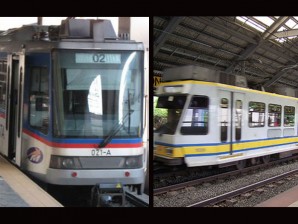Bayan Muna vows to bring LRT, MRT fare hike issue to SC in January
MANILA, Philippines – With Congress unwilling to break their holiday and hold special public hearings, Bayan Muna is going to the Supreme Court to put the breaks on the Department of Transportation and Communication’s move to increase fares of the Light Rail Transit (LRT) 1 and 2, and the Metro Rail Transit (MRT) 3.
Bayan Muna Representatives Neri Colmenares and Carlos Zarate said that that they would file the petition seeking a temporary restraining order (TRO) against the train fare adjustments of up to 200 percent in January.
The fare rate hike was announced by Transportation Secretary Joseph Abaya on December 20 and it will take effect in 15 days or January 4. Abaya said that the fare adjustments were long overdue as the last time the fare was increased for the oldest line was in 2003 while the fares of the LRT2 and MRT3 had never been increased since they opened. Abaya said the fare hike would slash P2 billion off the the P12 billion annual government subsidies for the trains that he claimed would be used for projects outside of Metro Manila.
Colmenares claimed that the DOTC did not follow due process in increasing the fares as no “sufficient” public hearing was held.
Sen. Grace Poe earlier castigated the DOTC for its deception when it did not even raise the matter during a Senate hearing on the poor state of the MRT trains a few days before Abaya’s announcement.
Colmenares also warned that the P2 billion in savings could be converted into a “pork barrel” fund of the Aquino administration.
Bayan Muna estimated that the fare adjustments would jack up the fares of LRT 1 from Baclaran to Roosevelt stations to P29 for a one-way trip from P12 and P15 at present; LRT-2 from Santolan to Recto stations to P24 from P20 per ride; and the MRT-3, between North Avenue and Taft Avenue, to P28 from P10 and P15 at present.
Zarate said that before increasing fares, the government should have determined whether the operational costs (specifically the lease agreement with the MRT builder, which guaranteed 15 percent return on investments for 25 years) of the trains were to blame.
“There is need for government to look into the operational costs of the MRT and LRT lines to check if there might be excessive expenses or mismanagement of funds,” said Rep. Zarate
Earlier, Quezon City Rep. Winston Castelo said the Metro Manila development committee, which he has been heading, could not hold public hearings on the LRT and MRT fare adjustments because the decision to adjust the fares was the prerogative of the executive department of government.
Castelo said he could only appeal to the Department of Transportation and Communications to defer the fare hike for another year since Congress had just approved billions of pesos for the LRT and MRT’s subsidies and other expenses in the 2015 budget and the 2014 supplemental budget.
The fare hike is supported by Cavite Rep. Elpidio Barzaga Jr. as a show of political will by the government to “take the bitter pill” amid in the face of strong public opposition.
“It’s a question of political will. The government is doing what it believes is right. It made an unpopular decision for the common good,” he said.
